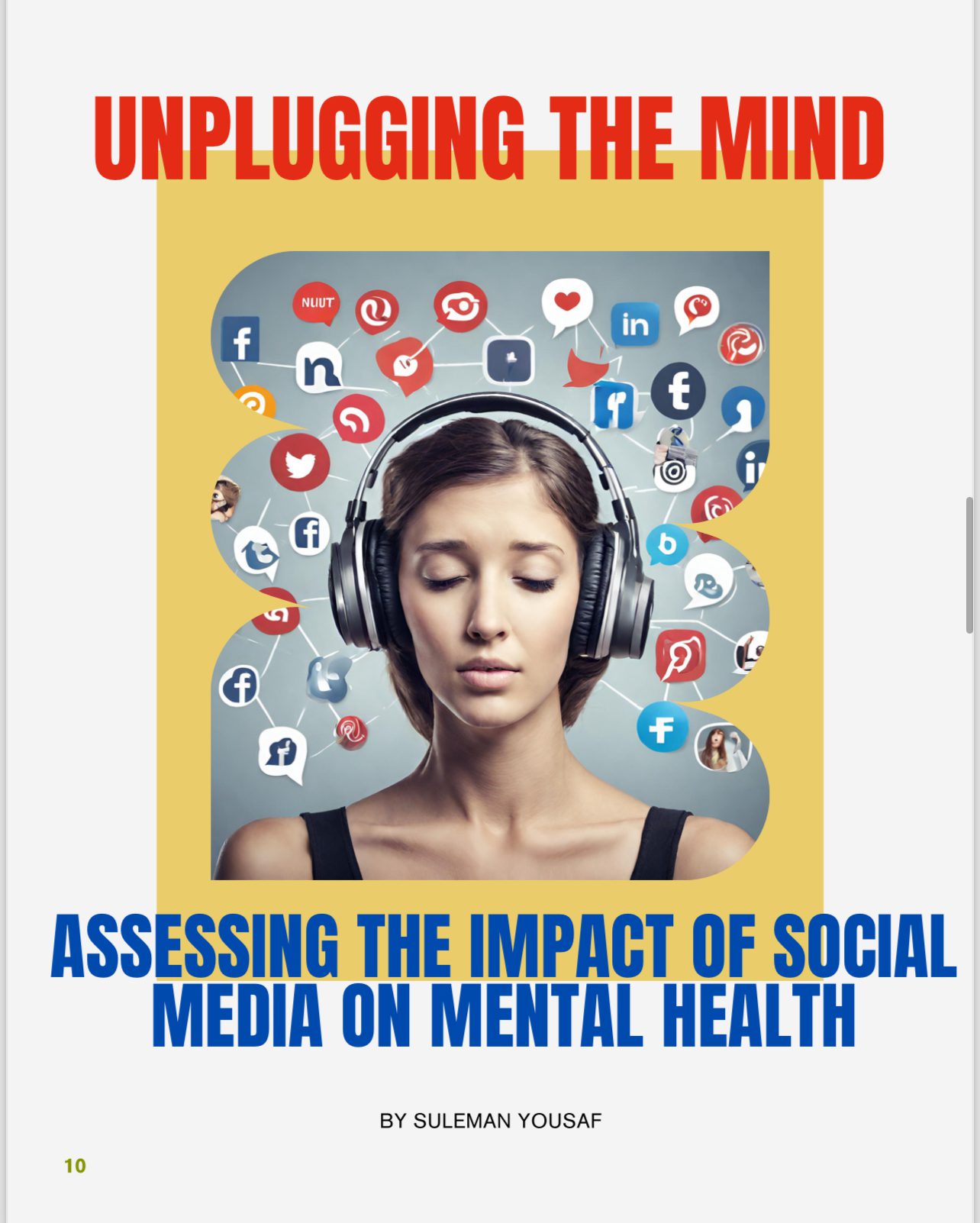By Suleman Yousaf (Pakistan)
Social media has reshaped how we interact and communicate in the modern era. Originating to connect individuals globally, different platforms, including Twitter, Facebook, Instagram, TikTok, and others, have evolved into integral components of our daily lives.
From connecting long-lost friends to impacting global conversations, the influence of social media is pervasive. It was just a tool of communication back in the day but has turned into a ubiquitous force that has started to take its toll on the mental health of many across the globe.
This article will explore social media’s exponential growth and cultural significance and comprehensively assess its intricate relationship with mental health. The Social Media Paradox has a complex duality, exhibiting positive attributes and traces of potential mental health pitfalls.
In the current digital age, social media provides a semblance of connection and bridges geographical gaps while facilitating virtual communities. However, this so-called “togetherness” masks the depth of these relationships.
Online interactions have a curated nature, and they can create an illusion of meaningful connections. Here, individuals present idealized versions of their lives, which raises questions about the authenticity of these friendships developed in the digital realm.
Digging deep into the intricacies of social media, the Comparison Trap is a psychological phenomenon fueled by constant exposure to carefully curated content.
Users often begin measuring their lives against the apparent flawless depictions presented on these platforms, leading to a pervasive sense of inadequacy.
Exploring this phenomenon delves into the impact on self-esteem as individuals grapple with unrealistic beauty standards, achievements, and lifestyles.
Apart from the Comparison Trap, these online interactions have some other negative influences. With the increase in connectivity, a rise in harassment and gyberbullying cannot be ignored, and it has created a hostile environment for many users.
The profound impact these malicious behaviors have on mental well-being, as users become targets of threats, abuse, and humiliation in the digital world.
The Fear of Missing Out, or FOMO, is another variant of social media anxiety that stems from the relentless exposure to seemingly exciting experiences of others online.
As social media users scroll through the curated content feeds on different platforms, the fear of being left out of the loop begins to kick in, contributing to the heightened sense of inadequacy.
There was a major US-wide lawsuit that major social media companies, including TikTok, YouTube, Facebook, Instagram, and Snapchat, lost recently over the role that these companies have played in youth mental health crisis.
This lawsuit represents hundreds of parents and their children as plaintiffs and alleges that these platforms were made addictive for the users and have harmed young users. Moreover, the said platforms haven’t informed the parents about social media’s associated risks. These risks include depression, anxiety, body image issues, eating disorders, and suicidality,
The defendants, including the parent companies of these social media platforms, such as Google, Alphabet, ByteDance, Snap, and Meta, asked the court to dismiss the litigation and argued that they are immunized by law from the plaintiffs’ claims.
There was a major US-wide lawsuit that major social media companies, including TikTok, YouTube, Facebook, Instagram, and Snapchat, lost recently over the role that these companies have played in youth mental health crisis.
This lawsuit represents hundreds of parents and their children as plaintiffs and alleges that these platforms were made addictive for the users and have harmed young users. Moreover, the said platforms haven’t informed the parents about social media’s associated risks. These risks include depression, anxiety, body image issues, eating disorders, and suicidality,
The defendants, including the parent companies of these social media platforms, such as Google, Alphabet, ByteDance, Snap, and Meta, asked the court to dismiss the litigation and argued that they are immunized by law from the plaintiffs’ claims.
They cited Section 230 of the 1996 Communications Decency Act, which has protected internet companies from any legal liability in different circumstances for a long time from publishing third-party content online.
But the Federal Judge in California partly dismissed the companies’ motion in a lengthy ruling, stating that the companies should be held accountable for faulty product features, such as imperfection-blurring photos and edited but not mentioned filters. These features expose the users to unrealistic body ideals and prompt them to compare themselves with others negatively.
Judges also ruled that companies could be held accountable for failure to implement parental controls, protective usage in frequency and duration of use, and robust verification processes to determine user age, which is also a product defect. Social Media companies have duties towards their users while creating certain products that can be defective; they can be sued for negligence in association with any defects in those products.
Various studies have been conducted to identify the relationship between social media and mental health. Still, one particular study in this regard has recently captured a lot of attention. This study was conducted by Jonathan Haidt, a social psychologist widely acknowledged for his work in cultural psychology, morality, and politics.
Haidt says, “Much more than for boys, adolescence typically heightens girls’ self-consciousness about their changing body and amplifies insecurities about where they fit in their social network.” But there is no telling why the use of social media influences more teen girls than teen boys, except that teenage girls mature faster.
It’s just this general fact around which the author has established a claim that needs more study. All stakeholders must understand how to navigate the use of social media and take adequate responsibility. Social media companies must design their products with corporate social responsibility in their maids.
Users must also keep track of their social media usage and implement breaks to keep their minds fresh and healthy. Parents and teachers in schools also have a role in assisting children in maintaining a healthy balance between the real world and social media activity.
Suleman Yousaf (SY), a seasoned writer with a decade of expertise, illuminates diverse niches through the pages of “The Advocate Post.” With a potent pen, SY channels over a decade of writing and editing experience into shedding light on issues deserving of attention. A dedicated storyteller, SY’s work resonates with a passion for meaningful narratives that inspire and inform.






This Post Has 2 Comments
Thanks for sharing such a pleasant idea, post is fastidious, thats why i have read it entirely
You are welcome. Thank you for your appreciation. Follow us on social media handles as well and be informed